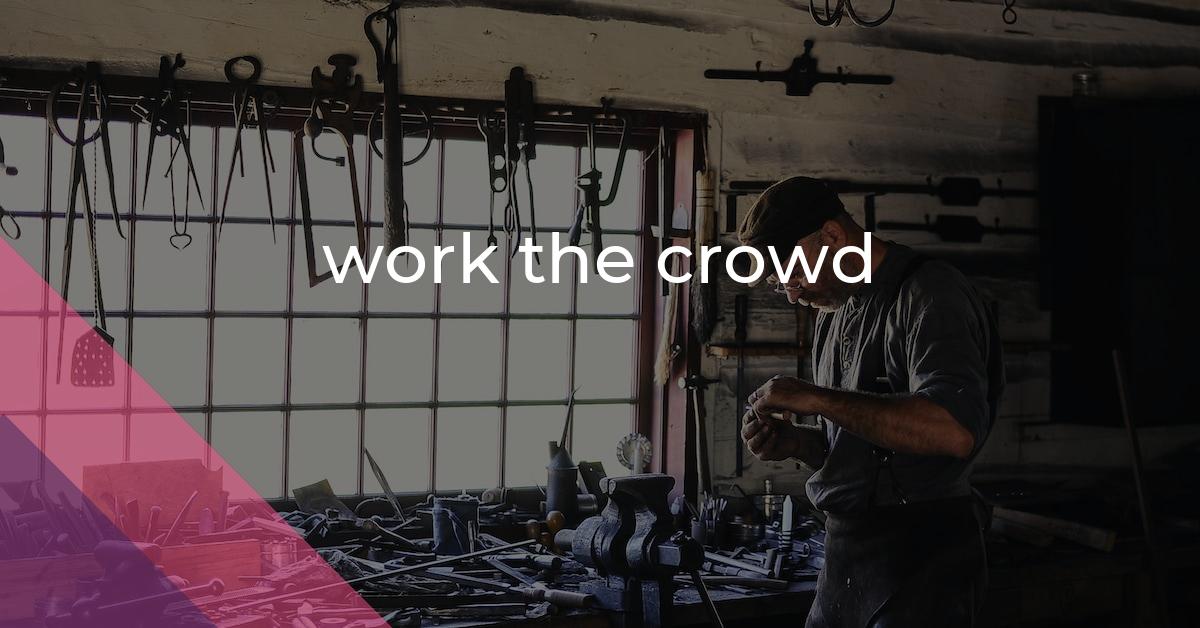work the crowd: Idiom Meaning and Origin
What does ‘work the crowd’ mean?
The idiom "work the crowd" means to engage with and interact effectively with a large group of people, often in a public or social setting. It implies being skilled at managing and connecting with a diverse audience to achieve a desired outcome, such as gaining support or attention.

Idiom Explorer
The idiom "you lot" is used to refer to a specific group of people, usually in a dismissive or derogatory way. It implies a collective identity and implies that the group being referred to is seen as unimportant or insignificant.
"Work the room" is an idiom that means to circulate and interact with people in a social setting, usually with the intention of making connections or gaining influence.
The idiom "work someone's ass off" means to make someone work extremely hard or exert a great deal of effort. It implies intense labor or a demanding workload.
The idiom "work someone's arse off" means to work extremely hard or put in a lot of effort to achieve a task or goal.
The idiom "work one's fingers to the bone" means to work extremely hard and tirelessly, often to the point of exhaustion, in order to achieve a goal or complete a task.
The idiom "work into the ground" means to exhaust or overwork someone to the point of physical or mental fatigue.
The idiom "working girl" refers to a woman who is employed in a job that typically involves manual labor or providing services, often with implications of being in a lower social or economic position.
The idiom "worked up" means to be in a state of agitation, anxiety, or excitement. It often implies that someone is overly emotional or upset about something, sometimes to the point of becoming irrational or exaggerated in their reactions.
Unleashing Charisma: Decoding 'Work the Crowd'
The idiom "work the room" is closely related to the concept of "work the crowd." While "work the crowd" focuses on engaging with a group of people, "work the room" specifically refers to the act of moving around a room and interacting with individuals in that space. This idiom is commonly used in social settings, such as parties, networking events, or conferences.
When someone "works the room," they are actively involved in connecting with people in a social setting. This can involve striking up conversations, introducing oneself, exchanging pleasantries, or simply being open and friendly. The goal is to make a positive impression and establish connections with as many individuals in the room as possible.
In a similar vein, the idiom "crowd sail" can also be related to "work the crowd." While not as widely used, "crowd sail" is a term that captures the idea of smoothly navigating through a crowd of people, engaging with them as you go.
Just like "work the crowd" and "work the room," "crowd sail" requires the ability to connect with people and create positive interactions, but with the added element of smoothly moving through a crowded area. This idiom is often used in situations where someone needs to navigate through a dense crowd, such as at a concert, festival, or crowded street.
When someone is "crowd sailing," they are skillfully maneuvering through a crowd, making their way to their destination while engaging with people they pass. This involves being aware of one's surroundings, making polite gestures, and navigating the crowd with ease.
The idioms "work the room" and "crowd sail" are closely related to "work the crowd." All three idioms emphasize the importance of engaging with people in a social or public setting. While "work the crowd" focuses on the act of engaging with a group, "work the room" specifically refers to moving around a room and interacting with individuals. Similarly, "crowd sail" captures the idea of smoothly navigating through a crowded space, engaging with people along the way. These idioms highlight the importance of creating connections, making positive impressions, and establishing relationships in various social and professional contexts.
Example usage
Examples of how the idiom "work the crowd" can be used:
- At a political rally, the candidate worked the crowd by shaking hands and engaging in conversation with as many people as possible.
- The lead singer of the band worked the crowd during the concert, encouraging audience participation and getting everyone excited.
- During a comedy show, the comedian worked the crowd by interacting with audience members, making jokes tailored to specific individuals.
More "Communication" idioms



